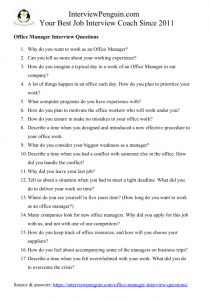Office Manager is typically only a fancy job title companies use as a cover for a role of a Secretary, or of an Administrative Assistant. Manager is a buzzword and, statistically speaking, more people will apply in this case. We prefer managing something to assisting someone, even though the only difference may be on the job contract :).
To do the companies justice, however, some of them may actually look for a manager, for someone who will supervise a few administrative workers in a bigger office, allocating work to other people, and doing some office work with them.
I am not writing these words to discourage you from applying, however. My goal is simply to explain what will happen in your interview for a job of an Office Manager–which can be something different than what you expected. Let’s have a look at questions you will face, and how you should answer them to make an impression on the hiring managers.
Table of Contents
Why do you want to work as an Office Manager?
Talk about your skills and experience (if you have previous working experience), and how they match the job description.
You feel like a fish in a water when running daily operations of the office, including answering calls and emails, preparing correspondence, doing simple accounting tasks, helping your superiors with their schedule, typewriting, making great coffee, simply doing everything that belongs to a typical day in the office.
You should always talk more about managing the office than about managing people, unless they explicitly write on the job description that you’d be responsible for managing work of few other employees (clerks, assistants, etc).
* May also interest you: Secretary interview – Why do you want to be a secretary? 7 sample answers.
Can you tell us more about your working experience?
Talk about the most relevant roles you had–if you had more jobs before. You can always list a few duties you handled, especially if they match with the job description for your new position. You can also add a short explanation how your former job prepared you for a role of an Office Manager.
And if you have no previous experience (it isn’t necessarily a showstopper in this case), ensure them that you understand what will be expected from you in work, and feel confident to handle your duties. Many companies run training programs for new office managers and may therefor hire people without previous experience…
How do you imagine a typical day in a work of an Office Manager in our company?
Good answer to this question can move you much closer to a coveted job contract, and a bad one can send you home empty handed in a flash.
Because this is exactly the point when you explain your expectations. Read the job description carefully. Are they really looking for a manager, or is it only a fancy job title for a secretary, or for an office clerk?
If you misinterpreted the job at this point, they would not hire you. For example, if you said you expected to assign tasks to office workers and supervise them during the day, but in fact you’d not supervise any other people in the job, they would not hire you. Let me stress it again: read the job description carefully, and show realistic expectations.
One more thing matters at this point: there should be some logic, some system in your description of a typical day. You should not simply repeat the working duties from the job description.
Start by saying that you imagine arriving early, checking the schedule for the day, making a to-do list (if you didn’t make one previous afternoon), and just then talk about individual tasks, such as answering emails, greeting visitors, coordinating appointments and meetings, etc.
A lot of things happen in an office each day. How do you plan to prioritize your work?
Once again, you should demonstrate your organizational skills, time management skills, and experience with managing the office.
You can say that you will always set daily and weekly goals, and prepare to-do lists. You may use Eisenhower Matrix to assign priority and urgency to the tasks on your to-do list and work accordingly.
Of course, once you get into the groove and understand the daily life of the office and expectations of your superiors, it will be easier for you to prioritize your work, to do the most important things first, and reserve low hours for tasks that aren’t urgent or particularly important.
* May also interest you: Office coordinator interview questions.
What computer programs do you have experience with?
The more programs you mention the better. MS Office (or equivalent popular in your country) is a bare minimum for this job. Ensure the interviewers that you’ve been working with it long enough, and can do basically anything with Word or Excel, including making charts, doing simple mathematical and statistical calculations, preparing presentations, handling email correspondence, and so on.
When you talk about other programs (schedulers, office management software, etc), be sure to explain what the program does and how it helps you in your work. Your interviewers are neither geeks nor software engineers, and may not be familiar with names of some software products.
You can also ensure them that you are strong with computers and a quick learner. If they use in their office a program that isn’t familiar to you, you will quickly learn to work with it.
How do you plan to motivate the office workers who will work under you?
You will get this question only if they expect you to manage and coordinate the work of some clerks and assistants in the office.
If it happens, do not talk about financial incentives or about anything else that you can’t grant the employees from your position. Try to be more creative.
You can say that you will always try to go by an example, working hard, helping with administrative tasks. Basically you will set an example of a hardworking worker for other people in the office.
Building good relationship with the people, and trying to create a friendly and motivating atmosphere in the office, are other means of indirect motivation. You can also say that you will try to be fair and not prioritize one employee to another. Team building events and employee benefits (such as seminars and courses) can also help with motivation… You can also check 7 sample answers to “How do you motivate others?” for some inspiration.
How do you ensure to make no mistakes in your office work?
Everyone makes mistakes. You can actually win some extra points confessing that you made some mistakes in your previous jobs, and even claiming that mistakes can’t be avoided completely in a busy office.
Then you can say that you double check all important documents, would not aspire to handle the task that is outside your competences or expertise (for example elaborate accounting tasks, or making an important decision for on of your superiors), and will also try to have a daily contact with both your superiors and subordinates (if you have subordinates), to simply stay in the picture and on the top of things.
You can also add that you will try to learn from each mistake, and improve the processes in your work accordingly, to minimize the chances of repeating the same mistake again.
Other questions they may ask you in your office manager interview
- Describe a time when you designed and introduced a new effective procedure to your office work.
- What do you consider your biggest weakness as a manager?
- Describe a time when you had a conflict with someone else in the office. How did you handle the conflict?
- Why did you leave your last job?
- Tell us about a situation when you had to meet a tight deadline. What did you do to deliver your work on time?
- Where do you see yourself in five years time? (How long do you want to work as an office manager?)
- Many companies look for new office managers. Why did you apply for this job with us, and not with one of our competitors?
- How do you keep track of office resources, and how will you choose your suppliers?
- How do you feel about accompanying some of the managers on business trips?
- Describe a time when you felt overwhelmed with your work. What did you do to overcome the crisis?
* Special Tip: If you are not sure how to answer the questions from my list, or experience interview anxiety, have a look at our Interview Success Package. Up to 10 premium answers to basically all questions you may possibly face in your Office Manager job interview will help you streamline your interview preparation, find the right words in every moment of the interview, outclass your competitors, and eventually get the job. Thank you for checking it out!
Final thoughts
Office manager is a fancy job title, and it may not always be obvious what exactly you will do in work. But one thing is certain–you will compete with many people for the position (combination of a buzzword in a job title, and little requirements on education, will always attract many applicants). It makes this interview much more difficult.
Try to prepare for the questions we analyzed here, and remember that your non-verbal communication also matters. When you manage to build a good connection with your interviewers, it can make the difference between you and the second best candidate–as long as you both provided great answers to the questions of the hiring managers. You won’t have it easy, but you can succeed. I wish you good luck!
Matthew
* You can also download the list of questions in a one page long PDF, and practice your interview answers anytime later, even when offline:

Will also help you with your preparation for office manager job interview:
- Administrative assistant interview questions.
- Secretary interview questions.
- How would you describe your experience with MS Excel?


